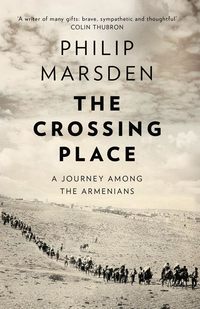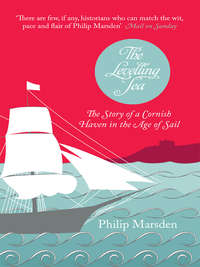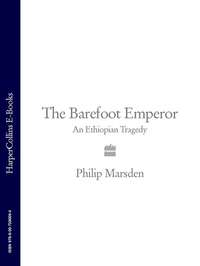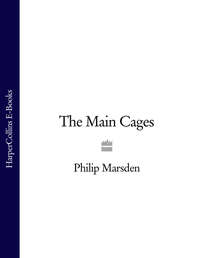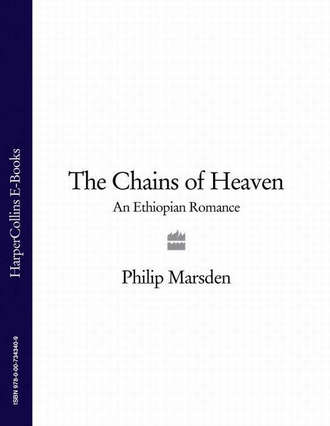
Полная версия
The Chains of Heaven: An Ethiopian Romance
The lure of Prester John was partly responsible for one of Europe’s most ambitious enterprises. When Henry the Navigator sent his fidalgos down the coast of Africa, he was hoping for an alliance with the great ruler. The Portuguese popular imagination had already been fed by the chapbook Libro del Infante Pedro de Portugal, which included a mythical visit to Prester John by the brother of Henry the Navigator.
The Portuguese weren’t the only ones hunting for Prester
John. A merchant from Ragusa or Dubrovnik, Vincenzo Matteo, was reported to be on his trail. The Dutch thought the Zambezi a possible route to the kingdom, and called it Prester John’s river. But it was the Portuguese who were the most dogged. In 1487 King John II despatched an envoy from Lisbon overland to find Prester John. He reached the Ethiopian court, the first recorded European to do so, but he never returned.
It is another Portuguese, Francisco Alvares, who gives us the earliest report of Prester John. In 1520 he and his party arrived in Ethiopia from Goa. After months of travelling they came to the king’s camp. They had to wait days for an audience. At last the summons came. They were shown in behind a set of curtains. Beyond these curtains were others, made of even finer cloth. Behind them was a room laid with beautiful carpets and a dais which was concealed behind a further set of curtains. When these were drawn back, there he was—King Lebna Dengel. On his head was a great crown of gold and silver, and in his hand was a silver cross. A veil of blue taffeta covered his mouth and beard, and his robes were of gold brocade.
Even so, Lebna Dengel and his mountain kingdom were something of a disappointment. The Ethiopians were clearly in no position to launch a crusade; they themselves were too busy trying to keep the khanates of the plains from invading. This Prester John was certainly Christian, but he was no saviour, and his people were frankly pretty poor.
The world lost a little of its colour. In Portugal, millennial enthusiasts transferred their hopes to Sebastianism, the cult of the conquering ascetic, the martyr-king Sebastian I who succeeded in returning from the dead on four separate occasions.
Not for the first time, nor the last, Ethiopia had helped give solid form to rumour. The Ethiopians themselves were as baffled then by this ’Prester John’ as they have been more recently by the Rastafarians’ elevation of Haile Selassie. In 1441, an Ethiopian delegation to Rome became quite irritated with their interviewers: ‘We are from Ethiopia. Our king is Zara Yaqob. Why do you call him Prester John?’
Before leaving the monastery of Yimrehanna Krestos we called in on Abba Gobeze—‘herbalist, wise teacher, old man’, according to the priest.
His hut was dark and hot. He was lying on his bed. He was gazing up into the corrugated iron roof. From a crossbeam of eucalyptus hung his clothes. He was in a good mood. His brother had come to see him from Lalibela and brought news and some medicine. His brother was not a monk but a priest, and he sat on a stool by his bed.
First on one elbow, then another, Abba Gobeze raised himself up. He glanced at me; he had wonderfully hooded eyes which, once seen, made you want to hear his every word. He stretched up his hand and from the beam above drew down a shirt.
‘Yimrehanna Krestos, he is a saint and a king, and also a priest.’ He spoke faintly. ‘Ethiopia is always the representative of God…Foreigners are now coming to Lalibela to learn…the whole world will learn from Ethiopia…’
He paused to arrange the shirt on his lap, and laughed at himself: ‘We monks, we are dead people. We have no physical life.’
His brother nodded proudly as if to say: He is a monk, you understand, a hero of the war between world and spirit.
Abba Gobeze put his hand-cross on the blanket. ‘Yes, we just hold our lives in our hand. Death is always close beside us.’
Death certainly did not seem far away for old Abba Gobeze. His body had little flesh on it. After doing up each button he paused to catch his breath. His shoulders rose with the effort. Once the shirt was on, he took down another. This one went on more quickly. He swung his legs down. They didn’t quite reach the floor, and he spent a moment looking at his toes.
‘Our bodies are nothing!’
Then he pulled down a jersey. He pulled down a pair of trousers and a belt. With each layer his strength increased. He ran his hand playfully through the remaining clothes. Most were rags, strips of torn green serge, corners of brown homespun. He took another pair of trousers and pulled them on over the first. He began to sing. ‘Yejamarish inje yecharesech…dum-da-yesh…da-yesh…er…’
His brother said, in a stage whisper: ‘He has been very unwell.’
Abba Gobeze couldn’t remember the rest of the song. ‘My brothers taught it to me. They went to the coronation of His Imperial Majesty. It was in Addis. I was too young to go.’
‘We were both too young to go,’ echoed his brother. ‘In fact, I wasn’t born.’
‘Are your family from this region?’ I asked.
‘Always from here!’ boomed Abba Gobeze. ‘Father was a priest, grandfather was a priest. All priests—’
‘They were all priests. Always priests!’
Abba Gobeze scowled at his brother. ‘My children are not priests. Not one.’
‘Children, Abba?’ I asked. ‘But you’re a monk?’
‘I became a monk when my wife died. My children are in Addis now. They are teachers, lawyers, people like that.’
‘One of them’s a doctor!’ beamed his brother.
‘Would you rather they had been priests?’
‘Yes, of course,’ the Abba’s brother nodded.
‘No,’ countered Abba Gobeze. ‘Look at us—we’re just ignorant. When we were young we were only looking after cattle and sheep. But they are educated.’
He looked up. From the cross-beam he took down the final piece of his dress—a cotton scarf of such age that it had reverted to the colour of the earth itself. Bandaging it around his head, he began again to sing.
He was still singing when we left. His brother saw us to the door and out into the midday sun. He pointed out the road ahead and we followed it down into the valley, rising and falling with it over a series of rounded hills.
5
It was late in the afternoon when we reached the rock-hewn church of Bilbala Giorgis.
‘Very holy place!’ With his dula, Makonnen pointed to the traffic of bees around a blind window. ‘Their honey—you must take it for illness of legs, for illness of the stomach, and—’ he tapped his temple ‘- illness of the head.’
A man sat alone in front of the church. He was pestling the red tufa to granules.
‘What is that used for?’ I asked him.
He looked at our mules and our baggage. ‘Men take this one to prevent journey-accident.’
‘Usshi, usshi,‘ I conceded, smiling.
I bought a cup of the powder and put it in water. I stirred it with a pencil, drank it and passed the cup to Hiluf. It tasted of, well, ground-up rock.
‘Do you think that will see us to Aksum?’
‘Aksum?’ The man frowned and shook his head. ‘You’ll need more.’ He watched me fill a film canister with the dust. ’The people who took it to fight the Italians or the rebels—those who took the soil always came back. Always.’
Below the church was Bilbala itself. It was a brown and dusty town. The buildings were brown and dusty, the road that split the buildings was brown and dusty, and the children who played in it were brown and dusty. The only colour was the orange and green of plastic bottles hanging outside a store.
We pitched our tent in the grounds of the town’s clinic. A sign outside, in Amharic and English, urged RESPONSIBLE REPRODUCTIVE BEHAVIOUR.
Darkness fell upon Bilbala with a series of shouts, ox-bellows and baby-wails. We sat with the clinic guard. He was an elderly man and had fought for the rebels.
‘We killed many Derg soldiers, many,’ he recalled. ‘Some of them were even my neighbours.’ He had a warm and friendly face.
I spread out the maps on the clinic’s concrete verandah. The light from my head-lamp picked out Bilbala and Amda Worq, and between them several inches of alarming gradients. Tigray and Aksum were a whole yard away in the darkness—and Lalibela just a thumbnail south of Bilbala. For all the aches and sweat, we’d done nothing. Folding away the map, I let the word ‘bus’ seep into my forward planning.
At dawn two sets of headlights raked across the scrub beyond Bilbala and bumped away to the south. In single file we climbed the low embankment and crunched across the gravel of the main road. The mules slid down the other side, and trotted ahead with a jangle of cooking pots. The air was crisp. Behind us, the fingers of the sun stretched high above the ridge of Abune Josef. We headed north-west into the hills. The path was a shadow of a path. It followed a series of gentle valleys. Sometimes it disappeared altogether.
Bisrat hummed quietly as he walked. He was taller than Makonnen and had a very gentle manner. He walked with soft slow steps but covered the ground at a great pace.
Soon after midday we reached a shallow gorge. It was too hot to carry on; in the shade of some ironwood trees I called a halt.
Makonnen unloaded the mules. He fell asleep against the bags. I lay back and enjoyed one of walking’s simple rewards: gazing up at the sky. It glowed deep blue between the leaves. A bird was going puk-puk-puk…puk-puk-puk…It took a while before I spotted its blood-red throat: double-toothed barbet, according to my Birds of Eastern Africa. I dozed off.
Bisrat was busy prodding at the ground with a stick when I woke. He had an expression of childlike innocence. I found myself hoping that everything was OK for him. As I watched, a faint smile spread across his face.
‘What are you thinking, Bisrat?’
‘It’s all right. I’m not thinking anything.’
He carried on with his prodding.
‘Were you born in Lalibela?’
‘I was born there, yes.’
‘Do you have family?’
‘I have five children. Three brothers, two girls. My wife is dead.’
‘What land do you have?’
‘Three timat. But it’s not good land. It’s stony.’
‘What can you grow?’
‘Only barley and teff.’
‘Is it steep?’
‘It’s half steep and half flat.’
‘Enough for consumption?’
He shook his head. ‘I collect relief food for two months.’
‘And is this mule yours?’
‘No.’
Bisrat had no livestock at all. Until recently he had had no land either. He had always worked for others. But when the Derg fell he was given land—three timat of land that no one else wanted.
He gave me a look of genuine gratitude. ‘My life is better now, thanks to God.’
Some way further on, we spotted the round roof of a church. Its compound was bordered by euphorbia—not the candelabra euphorbia but the k’inch’ib tree - Euphorbia tirucallii—known as ‘finger cactus’ for its fat succulent leaves.
A couple of priests were reclining in its shade; they were an elderly priest and a young priest. Two laymen reclined with them, and one of the laymen, it turned out, was having a little trouble with his daughter.
‘I have found someone for her. He comes from Tara. But she will not have him.’
‘Why not?’
‘She wants to go to Bilbala to work.’
‘She is throwing her life away!’ said the young priest; he was very interested in two pebbles by his feet.
‘I told her, I told her.’
‘That is good.’
The men were all agreed that the girl needed correcting, and in their agreement they lapsed into a satisfied silence.
‘What is happening? In the old days girls were afraid.’
‘They won’t do grinding now.’
‘The government tells us a girl cannot marry until she is eighteen.’
‘You cannot expect a girl to keep her virginity until then.’
‘Now if you show her your back for one minute,’ said the old priest, ’a girl will throw away her virginity.’
‘It is better if they marry young.’
‘Eleven is the best age.’
They lapsed into another satisfied silence. Across the valley, a man was driving two oxen to plough.
I asked the men: ‘Do foreigners ever come here?’
‘Foreigners?’
‘Foreigners have never been here.’
‘I saw foreigners once,’ said the elderly priest. ‘In Lalibela. They looked very worried.’
‘They were probably ill,’ concluded the man with the troublesome daughter.
The young priest nodded. ‘Ill,’ he muttered. He showed no interest at all in his first foreigner. He was trying to arrange the pebbles on a flat stone, but they kept slipping off.
The way to Amda Worq took us to the edge of another gorge, much deeper than the first. The path narrowed and we were dropping down through rock-chutes, then along the cliff in a steep diagonal. We could see the same line in the path on the opposite side. Far below was a corridor of pale shingle. Loose stones chinked like broken china at our feet. The rock was cut back in places where the water cascaded down the cliff. But there was no water now. We jumped the last few feet onto pebbles and the mules were pressing their nostrils to the green trickle which was all that remained of the river.
We had a problem climbing out of the gorge. The mules reached a slope of bare rock. Their hooves splayed when they tried it. They slid back. Bisrat and Makonnen freed them of their loads. I looked at the angle of the rock face and thought: this is impossible. Hiluf shook his head. So what now? This was the only path. There were no bridges—the Sekota road was a day’s walk in the wrong direction. In the rains the entire area was cut off.
The first mule tried again—and slipped back. Bisrat put a rope around her halter and tugged. Makonnen pushed from below. Three, four steps up. She sidestepped, away from Makonnen. Then they were both sliding. Below them was a gully which dropped sheer to the river below. Makonnen cried out. Bisrat yanked. The mule stretched her chin but her legs were floundering. Makonnen was on his knees, on the very edge of the gully. Bisrat pulled again. ‘Ayzore! Ayzore!’ One of her sliding feet gained purchase. Then the others. The second mule followed more easily.
Makonnen was grinning as he reloaded. Relief drove a monologue, delivered in an intermittent falsetto. ‘Oh be praised, Mother of God…keep us safe from danger and bless this road which is so steep…which is so difficult…oh Lord, this terrible road, it is too steep.’ His hands were shaking.
Above the cliff, the path levelled out. It crossed an area of terraced plots; we were joined by a man with a mattock over his shoulder. He saw the sweat covering my face and neck.
‘We were born to suffer on these roads. But why the farenj?’
His village was a speckle of brown huts high above us. Twenty or thirty people gathered as we stepped between brush fences. A young woman served us tella from a cool earthenware jug. She had a certain way of holding the jug and half-hiding her face. Makonnen held out his mug to refill; he was still animated from earlier, and he gave her a conquering smile.
It was already evening when we cleared the ridge. A cold wind swept up to meet us. A whole new world opened at our feet—grey cliffs and islands of yellowy fields wherever the ground was level enough. To the west, cloud hid the late sun. The strip of sky beneath was a fierce liquid orange.
‘Hard land,’ mused Bisrat, letting out a low whistle. ‘Hard land.’
Just below was a lone pair of huts. Above the wind, I said: ‘What about there, Hiluf?’
‘We’ll send the others ahead.’
‘They might object to me?’
‘Also me!’
Bisrat and Makonnen came back flanking a wiry old man called Teshome. It was all fine. We led the mules through a gap in the fence. We bought feed from Teshome and put up the tent.
I sat and loosened my boots. This was a lot tougher than I’d expected. The relentless up and down: up, when each step was an effort; and down, when your knees were constantly flexed and you had to watch every footfall on the bare rock, or on the loose sliding stones.
I took a long swig of water. Today’s intake: three and a half litres. And to eat: a few biscuits at midday; in the morning, half a bowl of last night’s spaghetti; now some packet soup and a tin of sardines. I could feel the dizziness from too much sun. I unpacked the stove and again the subversive thought came: buses—rattling boneshakers, rolling kilns on wheels, happily pushing back the miles towards Aksum!
Later, after the sun and the temperature had dropped, we sat with Teshome in the moonlight. Two families lived up here—two old men, two elderly women, two young women and a very large number of children. The young men, said Teshome, had taken the livestock to the lowlands.
In 1984, when the BBC first aired footage of the Korem feeding camp, many of those staring faces came from this area. The Derg had lost the entire region to the rebels. But the rebels could not cope with the famine. I asked Teshome about that time. In the Ethiopian calendar it was 1977.
‘Sabat-sabat?’ He stared at me without expression. ‘You must not even talk of it.’
‘How was last year’s harvest?’
‘The crop was destroyed by hail.’
He looked away. In the pale light, his profile was impassive. ‘My God,’ he hissed, ‘save us, have mercy upon us.’
The next morning we left early. Teshome walked with us. The descent continued in a series of giant steps. A troupe of gelada baboons was feeding below. Teshome picked up a handful of rocks and we all joined him, pitching the rocks and shouting. The baboons loped off across the stubble.
We said goodbye to Teshome.
‘You will reach Arzilo tomorrow,’ he said. ‘Amda Worq is not half a day from there.’
We dropped to the next layer of terraces. When I looked up Teshome was still there above the cliff, watching us go. The baboons were waiting in the trees.
We were resting at the top of a pass. The mules were nosing the dust for food when we heard whistling from below. It was a man with a goat. Over his back was a masenqo, a single-stringed fiddle and bow.
He joined us in the shade and, placing the masenqo between his knees, looked at each one of us. Then he started to play.
‘People travelled far like the clouds but could not find the way back to their home. Wherever we may wander Please God make sure we find our way home So that we may not perish in the desert.’
He was an azmari, one of a caste of wandering musicians. He had been playing at a three-day wedding; the goat was his payment. Now he was on his way to another wedding near Bilbala.
‘The best sorghum can be found in the region of Yejju. A man with a good baby will forever be remembered by that child.’
He gave an ambiguous grin. Ambiguity is the azmaris‘ stock in trade, the basis of their verses. It is also what makes the azmaris the most revealing aspect of all Ethiopian secular culture. Some of their verses are traditional, some direct, some spontaneous compositions about those present. But the most popular carry in them a heavy load of meanings, puns and allusions—and the heavier the better. ‘Weighty verses,’ goes the Amharic saying, ‘warm the insides like warm clothing.’
This style of figurative song has its own figurative name—samenna worq (’wax and gold’). To sculpt a gold figure, a clay cast is formed around a wax representation. The cast is heated, the wax pours out and the gold is poured in; once cooled, the cast is broken and the gold figure uncovered. Likewise azmaris compose verses that have an initial ‘wax’ meaning, and a more hidden ‘gold’ meaning. (For those who find ‘wax and gold’ too simple, there is an even trickier form known as wasta wayra—‘inside the olive tree’, olive bark being a very different colour to the wood.)
The anthropologist Donald Levine named his classic Amhara ethnography simply Wax and Gold. Working in prerevolutionary Ethiopia, he saw the verses as central to an appreciation of an entire way of thinking. ‘Wax and gold represents more than a principle of poetic composition and a method of spiritual gymnastics…Samenna worq colours the entire fabric of traditional Amhara life’.
He quotes an example:
‘Etsa balas balto addam kanfareshe Madhene alam lebe tasaqala-leshe.’ (Since Adam—your lip did eat of that tree The Saviour—my heart has been hung up for thee.)
This is pure wax and gold, in which the two meanings sit one above the other—Adam/lip and Saviour/heart. The wax meaning is: Because Adam ate of the Tree of Knowledge/The Saviour of the World has been crucified for you. The gold meaning shimmers beneath. It depends on the verb tasaqala being a synonym for ‘was crucified’ and ‘is anxious to be near’. So listeners would smirk when behind this piety they heard: ‘Because of your [tempting] lips/My heart is anxious to be near you.’
While celebrating its complexity, Levine saw qene and samenna worq as an obstacle to progress in Ethiopia: ‘nothing could be more at odds with the ethos of modernisation than a cult of ambiguity…modern Western culture rests on a commitment to unambiguous communication’. At the time of his work, in the 1960s, ethnography was relying more and more on linguistics. And the most unambiguous language of all was about to come into its own: binary, the language of computers. In Ethiopia, the revolution was only a decade away.
The azmari pressed his ear to the sound box. He retuned the horsehair string.
‘The home of the beauty of Rayanz is at the banks of the Abbay river
His chest burns like the cooking-pan…’
The next verse was a little more direct:
‘Death is a horse always riding towards us Let’s eat and drink and keep that horse away.’
So we ate—I produced bread and biscuits, and water. I also fished out some money.
‘Whisky refreshes—beer cleans the blood It’s very good to play to Father Farenj! May God bless this green place where I met Father Farenj!’
The azmari untied the goat, put the masenqo over his back and set off southwards. We had walked on some way before Makonnen let out a sudden squeal of pleasure.
‘Father Farenj! Father Farenj!’ he mocked. ‘You—Father Farenj! With your pocket full of money!’
We dropped down into a third gorge. As we crossed the river and climbed up the first steep section we came across a boy half-sitting and half-lying beneath a bush. It was very hot. The sweat glistened on his cheek. Two flies were angled at the caruncle of one eye. He had malaria.
‘Leave me.’
‘You can’t stay down here,’ urged Hiluf. ‘Night is coming.’
‘Leave me…’
His chin dropped to his chest. We gave him water. We took him by the arms. Once on his feet he was able to walk.
‘Eat.’ Hiluf pressed biscuits on him. ‘You don’t feel hungry but you must eat.’ He was in no doubt that the boy would die if left in the gorge.
He was young—in his late teens—and his story was this. He and a few others had been taking grain to the mill. It was a good half-day walk. They were on their way back when the fever set in. He had dropped behind. Those with him wanted to get out of the gorge before dark. They drove on the donkeys and were soon out of sight.
He was now delirious. It was dusk by the time we reached his village. We saw him off to his hut and arranged to stay the night in another compound. It turned out to belong to one of those who had gone to the mill.
‘Why didn’t you go back for him?’ I asked. ‘He had no water, no food.’
‘It’s all right. We spoke to his relations. They were about to go back and collect him.’
In the morning we went to see him. He was still feverish. He was shy and grateful. But it turned out he was a hired hand. His own family, with not enough land to support him, lived two days’ walk away. There were no relations to go back. He was simply abandoned.


